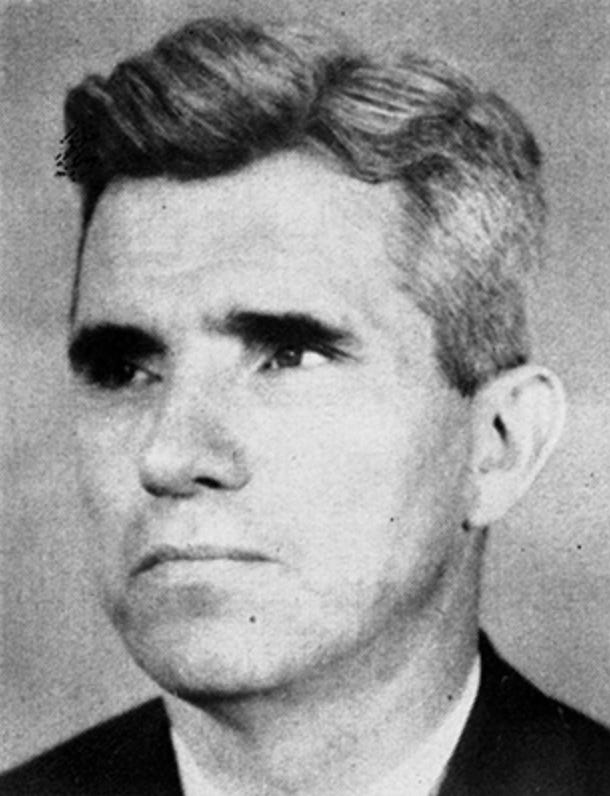Welcome aboard The Bus!
THURSDAY ARCHIVE EDITION - PUBLISHED (1.21) 16 JUNE 2022
The Stop
Joseph Banks (J. B.) Rhine (1895 - 1980) is credited with founding the field of parapsychology.1 Rhine originally trained as a botanist, but in 1922 he and his wife Louisa2 attended a lecture by Sir Arthur Conan Doyle3 who at the time was touring America promoting his research into psychic phenomena and spiritualism. Convinced of Conan Doyle’s sincerity and impressed by the ‘list of distinguished scientists about whom he spoke,’ the lecture changed their minds to the degree that as a couple they decided to devote their academic careers to examining this field. After a year at Harvard during which J. B. retrained in psychology and philosophy, in 1927 they moved to Durham, North Carolina where he helped establish the psychology department of the newly endowed Duke University. In 1930 he founded the Parapsychology Laboratory at the university and by 1935 had secured enough funding to set up its own building on campus.
Believing the ‘scientific method could be applied to any question,’ Rhine performed over 90,000 experiments in telepathy, clairvoyance, psychokinesis, and precognition.4 In the summer of 1930, he began testing for psychic ability among children at local summer camps, continuing with Duke psychology students in the autumn. Rhine teamed up with Karl Zener - a Duke perceptual psychologist - and together they created ESP cards (originally called Zener cards): a pack of 25 cards, with five each of a star, a circle, a cross, a set of wavy lines, and a square.
Tests typically involved a subject guessing the order of the 25 cards after they were shuffled. Early testing of Duke students produced results little better than chance, but ‘a breakthrough occurred’ in a session when a sophomore - A. J. Linzmayer - scored unusually well. In further tests, Linzmayer continued to guess at a rate well above that predicted by chance. The success of these initial experiments encouraged Rhine, and by 1932 he believed he had solid experimental evidence that ‘demonstrat[ed] the existence of psychic phenomena, which he named ‘extra-sensory perception’, or ESP.’ In 1934, Rhine published Extra Sensory Perception, summarising the first six years of his research.
Rhine continued to work at Duke until his retirement in 1965, publishing numerous papers and books, founding the peer-reviewed Journal of Parapsychology, and using his research to identify three tenets common to parapsychological, psychic or related phenomena (known collectively as psi):
All evidence points to psi as mental and not physical.
Psi is unconscious/spontaneous and apparently cannot be willed or consciously directed.
Psi is universal, and while some individuals are more gifted than others, it appears to be a ‘natural and widespread aspect of human endowment similarly affected by such factors as stress, boredom, fatigue, and depressant drugs.’
When he retired from Duke in 1965, Rhine moved his research off campus and established an independent international research centre he named the Foundation for Research on the Nature of Man (FRNM). In 1995, FRNM was renamed the Rhine Research Center and is still located in Durham, North Carolina.5
The Detour
Today’s Detour is to an article about the history of the role of theatre ushers. I must say I’ve never thought about this before and appreciated having my eyes opened: originally, an usher would have provided a spoken summary of the show as they led you to your seat; today, they search bags for contraband and enforce social distancing. Much more interesting than it sounds.
The Audiencers: The Secret Lives of Ushers
[Note: Though available in 2022, this article is currently behind a paywall. You may be able to access it through an incognito browser, but you can also access it by purchasing a subscription to the magazine - which you can sample free for a month.]
The Recommendation
Today’s Recommendation is Vaclav Smil’s6 Numbers Don’t Lie. Subtitled 71 Things You Need to Know about the World, the book is composed of 71 2-3 page chapters on topics ranging from how sweating improved hunting and the number of people it took to build the Great Pyramid, to why sunlight is still the best source of energy and just how safe it is to fly.7
From the back: ‘From Earth’s nations and inhabitants, through the fuels and foods that energise them, to the transportation and inventions of our modern world - and how all of this affects the planet itself … Professor Vaclav Smil takes us on a fact-finding adventure, using surprising statistics and illuminating graphs to challenge lazy thinking. Smil is on a mission to make facts matter, because after all, numbers may not lie, but which truth do they convey?’
Bill Gates8 is Smil’s number one fan. Here is his review of the book on his blog:
What sweat, wine and electricity can teach us about humanity
The Sounds
Today’s playlist is composed of five tracks I felt fit this issue’s photo of J. B. Rhine. I thought the National track - from 2013, the most recent song on the list - effectively set the mood, and as I’ve been listening to a good bit of Scott Walker recently, this song from Scott 4 (1969) came straight to mind. It also has an outstanding bass line, in my opinion. Though it’s essentially impossible to choose one Dylan track over another, this one from 1965 seemed to fit perfectly, as did the track from the Swans (1991) and the inimitable George Harrison (1970). Enjoy - and let me know what you think!
The Thought
Today’s Thought is a quote from Thomas Pynchon’s Gravity’s Rainbow which I thought appropriate considering the Stop’s topic - and the fact it seems to be the de facto policy in politics today:
“If they can get you asking the wrong questions, they don’t have to worry about answers.”
If you have a thought on this Thought - or any part of today’s issue - please leave a comment below:
And that’s the end of this stop - I hope you enjoyed a brief diversion from your regular journey!
Thanks to everyone who subscribes - I genuinely appreciate your interest and support. If you like The Bus, please SHARE it with a friend or several hundred.
If you haven’t climbed aboard, please do!
Until the next stop …
Parapsychology is the ‘study of mental abilities, such as knowing the future or telepathy, that seem to go against or be outside the known laws of nature and science.’ (Parapsychology (Cambridge) Sources for today’s Stop are Duke Archives, J. B. Rhine (Britannica), Louisa Rhine, J. B. Rhine and J. B. Rhine
Rhine was awarded a PhD in botany from the University of Chicago; Louisa also held a PhD in botany from the University of Chicago and was so involved in her husband’s research that some referred to her as the ‘First Lady of Parapsychology.’ For a biography of Louisa, see Louisa Rhine.
That’s right - the creator of Sherlock Holmes was really into this stuff. Which, in a way, makes … sense?
So, some definitions: telepathy is the ‘ability to know what is in someone else’s mind, or to communicate with someone mentally, without using words or other physical signals’, clairvoyance is the ‘power to see the future or to see things that other people cannot see,’ psychokinesis is the ability to ‘change the state or position of a physical object, using only the power of the mind,’ and precognition is ‘knowledge of a future event, especially when this comes from a direct message to the mind, such as in a dream, rather than by reason’. Yep, Stephen King has used them all as plot devices and without them, Stranger Things would be a lot less fun. All definitions from cambridge.org/dictionary/english
For many reasons - not least that parapsychology is today considered a pseudoscience at best and few if any of Rhine’s results have been replicated in strict scientific settings - Duke University is no longer affiliated with parapsychology. A scroll through the Psychology and Neuroscience Department’s course offerings doesn’t even include the word. However, just down the road The Rhine Research Center is still active. Check out their website to see what’s going on: Rhine Research Center
Smil is Distinguished Professor Emeritus at the University of Manitoba and the author of over 40 books. For a great article about him, see: Meet Vaclav Smil
You’ll be relieved to know: statistically, flying has never been safer.
Gates - a voracious reader - is the reason I’m aware of Smil in the first place as he was referenced in the Netflix documentary Inside Bill’s Brain. It’s certainly a worthwhile watch if you’re interested in what makes this man tick. Plus, he has a really cool library in his house.







I don’t know if you’ve covered it before Bryan, but the book “The Anthropocene Reviewed” would be a nice complement to the Smil book. I think the author is John Green …